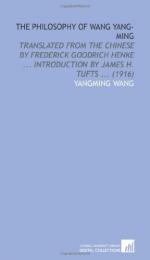|
This section contains 1,198 words (approx. 4 pages at 300 words per page) |

|
Wing-tsit Chan reminds the reader that "the philosophy of Wang Yang-ming is a vigorous philosophy born of serious searching and bitter experience" (1963, Chan's introduction, p. ix). Wang's doctrine of the unity of knowledge and action, for example, may be regarded as a forceful and concise way of stating the unity of his life and teaching during his formative years. For Wang, learning to become a sage involved a serious and resolute commitment to Dao or ren (humanity)—the ideal of "forming one body" with all things in the universe. Says Wang: "The great man regards Heaven, Earth, and the myriad things as one body (yiti). Moreover, the ren-person also forms one body with plants, stones, tiles, mountains, and rivers" (1963, p. 272).
Alternatively, one may characterize Wang's vision of the highest good as an ideal of the universe as a harmonious moral community. A commitment...
|
This section contains 1,198 words (approx. 4 pages at 300 words per page) |

|


